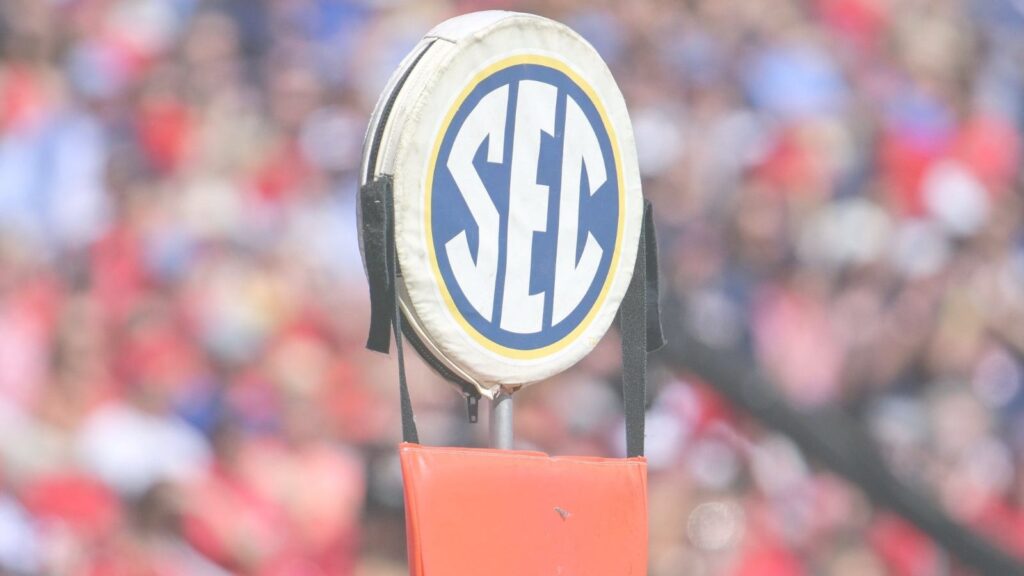Next SEC Expansion Team Odds: UNC, FSU, Clemson Favorites

Must be 21+ to participate (18+ in KY). Gambling problem? Call 1-800-GAMBLER (CO, IL, IA, KY, KS, LA, MD, MO, NC, NJ, OH, PA, TN, VA). Call 1-800-NEXT-STEP (AZ). Call 1-800-9-WITH-IT (IN). CALL 1-877-770-STOP (LA). Must be present in LA (select parishes). Licensee partner Amelia Belle Casino. Minimum $10 deposit required. Minimum odds -500 or greater. Bonus Bets wager excluded from returns. New customers only. T&Cs, time limits and exclusions apply.
When the SEC added Texas and Oklahoma, the Big Ten responded by adding USC and UCLA. And so began a tidal wave of college conference realignment, one that made megaconferences bigger and stronger, swallowing up everyone else in the chase for TV revenue.
Top athletic programs not in the SEC or Big Ten – in football, chiefly, but in all sports – see the estimated $100 million each SEC school will get in TV rights revenue by 2024, the first year the Longhorns and Sooners officially join the conference.
SEC commissioner Greg Sankey said conference expansion past its current 16 teams is not at the forefront of any conversations. But other schools would love to get in, and the SEC could push to 18 or even 20 teams by the end of the decade.
The lists of who wants in, and who gets in, aren’t the same. Bookies.com veteran oddsmaker Adam Thompson has broken down the landscape. Here are his updated college football odds as to which teams will be the newest members of the SEC – someday.
Must be 21+ to participate (18+ in KY). Gambling problem? Call 1-800-GAMBLER (CO, IL, IA, KY, KS, LA, MD, MO, NC, NJ, OH, PA, TN, VA). Call 1-800-NEXT-STEP (AZ). Call 1-800-9-WITH-IT (IN). CALL 1-877-770-STOP (LA). Must be present in LA (select parishes). Licensee partner Amelia Belle Casino. Minimum $10 deposit required. Minimum odds -500 or greater. Bonus Bets wager excluded from returns. New customers only. T&Cs, time limits and exclusions apply.
SEC Expansion Next Team Odds
| Team | Odds | Implied Probability |
| North Carolina | +300 | 25.0% |
| Clemson | +350 | 22.2% |
| Florida State | +400 | 20.0% |
| Virginia | +500 | 16.7% |
| Virginia Tech | +600 | 14.3% |
| Miami | +1200 | 7.7% |
| Oklahoma State | +1500 | 6.3% |
| The Field | +1300 | 7.1% |
Odds are projected and do not reflect any odds that may be available at legal betting sites or betting apps. They will not add up to 100% most times because they are designed to simulate a sportsbook line.
*Note: Odds reflect that more than one team is likely to join at the same time
SEC Expansion Odds: Which Teams Might Join Next?
The Pac-12 was picked apart by the Big Ten (Oregon, Washington, USC, UCLA), Big 12 (Arizona, Arizona State, Colorado, Utah) and ACC (Cal, Stanford). There's nobody left out west worth considering.
But TV revenue has been the catalyst for the conference musical chairs, and it’s pushing the latest moves by members of the ACC. Half of the conference’s teams have reportedly been digging into their own “grant of rights” agreement to see if they can break contracts and seek greener pastures.
Florida State and Clemson have led the charge. While a meeting last May among ACC schools provided positive reactions, credible rumors suggest the Seminoles and Tigers, as well as North Carolina, N.C. State, Miami (Paul Finebaum's pick to join the SEC over Florida State), Virginia, and Virginia Tech, plan to keep their options open.
The current ACC contract runs through 2036, and breaking the deal could mean fines of up to $500 million. That sounds massive, but if the SEC is offering close to $100 million annually, the math works to leave if a spot presents itself.
RELATED: 2023 Heisman Tracker: Can Caleb Williams Repeat?
Florida State and Clemson have football programs that would be beneficial to the SEC brand. Each geographic region has an SEC stalwart nearby, with Florida and South Carolina.
Florida State, in particular, has been pushing to get out of the current contract and find a new home. The Seminoles appear to be back under coach Mike Norvell, having posted their first 10-win season since 2016 last year. The 'Noles have the 10th-best odds to win it all this year, according to college football futures odds at FanDuel.
One possible hold-up? Roughly a decade ago, Georgia, Florida, and South Carolina made a gentlemen’s agreement not to allow any in-state expansion teams. FSU and Clemson, as well as Georgia Tech of the ACC, might find it tougher than expected to join.
A new report also suggests that FSU may be skipped by both the SEC and Big Ten for being a "disruptive partner," and for it not making financial sense due to its inability to add a new, lucrative market to the conferences. That is unless the ACC disbands altogether. That could push the Seminoles to the Big 12, too.
Still, money talks, and if FSU and Clemson best fit the bill, they’ll get the invitations. But it does open up the possibility of other schools getting the nod instead.
North Carolina may have the best all-around athletic programs of the bunch. That, and a relatively high academic standing, may push the Tar Heels more toward the Big Ten, if relocation occurs. The SEC has reason to move on UNC as well.
N.C. State, Virginia Tech and Virginia open up the SEC to new markets. Both Virginia schools have been linked to possible Big Ten expansion. The Wolfpack may have the best shot, especially if UNC goes to the Big Ten someday.
Oklahoma State is the most-likely team from the Big 12 which could join the SEC, though the Big 12 has been aggressive in building the third-biggest conference. It's unlikely they allow the SEC to poach more teams after losing Missouri and Texas A&M to that league in recent years, plus with Texas and Oklahoma bolting in the near future. The Cowboys should be at the center of the Big 12's future plans.
Rumors (not overly credible) say the SEC, already kings of both football and baseball, may look at basketball powerhouse schools to up the bar there. Kansas and Duke would be huge conference. UNC doubles up in making sense from his angle. KU adds a natural rivalry for Missouri. Virginia Tech and West Virginia work from football and geographical standpoints.
The Field includes other Big 12 teams and a few from the ACC that would certainly make the move if there was SEC interest, including Texas Tech and Louisville, even Notre Dame.
Must be 21+ to participate (18+ in KY). Gambling problem? Call 1-800-GAMBLER (CO, IL, IA, KY, KS, LA, MD, MO, NC, NJ, OH, PA, TN, VA). Call 1-800-NEXT-STEP (AZ). Call 1-800-9-WITH-IT (IN). CALL 1-877-770-STOP (LA). Must be present in LA (select parishes). Licensee partner Amelia Belle Casino. Minimum $10 deposit required. Minimum odds -500 or greater. Bonus Bets wager excluded from returns. New customers only. T&Cs, time limits and exclusions apply.
About the Author

Long established as one of the nation's premier handicappers, Adam Thompson joined Bookies.com in 2019 after a successful run as senior handicapper for SportsLine & CBSSports.com. He specializes in the NFL and MLB, where he's hit on well over 60% of his picks the past five years. Adam's NBA and horse racing picks have also produced consistent, major winners over the years.

 New bet365 Bonus Code BOOKIES: $200 Bet, Get MLK Day bonus for CFP Championship (Jan. 19)
New bet365 Bonus Code BOOKIES: $200 Bet, Get MLK Day bonus for CFP Championship (Jan. 19)  theScore Bet Refer a Friend Promo Code BOOKIES: Get $100 Bonus on CFB Championship (Jan. 19)
theScore Bet Refer a Friend Promo Code BOOKIES: Get $100 Bonus on CFB Championship (Jan. 19)  theScore Bet Promo Code BOOKIES: Make $100 in Bonuses for CFP Championship, NBA on MLK Day (Jan. 19)
theScore Bet Promo Code BOOKIES: Make $100 in Bonuses for CFP Championship, NBA on MLK Day (Jan. 19)  BetMGM MI Casino Bonus Code BOOKIESMI2500: Delivers $2,500 Bonus + 100 Spins (Jan. 19)
BetMGM MI Casino Bonus Code BOOKIESMI2500: Delivers $2,500 Bonus + 100 Spins (Jan. 19)  BetMGM PA Casino Bonus Code BOOKIES2500 Grants $2,500 Match Bonus + 100 Bonus Spins (Jan. 19)
BetMGM PA Casino Bonus Code BOOKIES2500 Grants $2,500 Match Bonus + 100 Bonus Spins (Jan. 19)
Comments